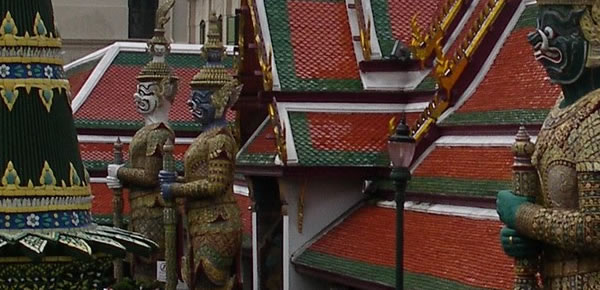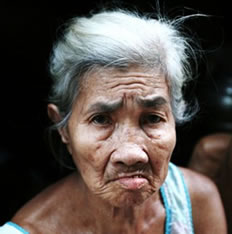
Originally known as Siam until 1939, Thailand is at times referred to as "The Land of Smiles" for its the friendliness of its people and their welcoming nature. The name is also said to be a reflection of the country's deep roots in the Buddhist religion, which was brought to the people by Indian merchants. Buddhism has become much more than a religion in Thailand. It is part of the country's national identity, making it difficult for the Thai people to receive the Gospel message.
Thailand has the distinction of being the only South Asian country to have never been colonized or ruled by a European country, having been an independent nation since 1238. In 1932, a bloodless revolution led to a constitutional monarchy, with the members of the royal family given near god-like status. In spite of their long history of independence, the Thai government is unstable. There have been at least 17 coups and attempted coups during the past 100 years. The most recent coup, in September 2006, occurred while the country's prime minister was visiting the United States.
Two of Thailand's 19th-century kings introduced Western-style education, and today the country enjoys a 96 percent literacy rate. Since most Thai television stations are controlled by the government, the people turn to newspapers for news with less bias. The Thai newspaper market is the largest in all of South Asia, with an estimated 13 million copies distributed each day. This nation of readers responds quite well to Gospel literature.
Thailand has a thriving, diverse economy, with strong trade throughout the world. Unfortunately, the burgeoning economy has not led to a significant increase in the standard of living for Thai citizens. The average annual income is just under $3,000. Thousands of tourists are drawn to the country each year by its natural beauty and friendly people. They come to see the ancient royal ruins and impressive Buddhist sites, soak up the sun on the country's magnificent beaches and do some bargain shopping. Unfortunately, others come to take advantage of the lucrative sex trade, especially in the larger cities. The open prostitution has led to an alarming rise in AIDS, now one of Thailand's leading causes of death.

According to the 2000 census, approximately 94 percent of the population is Buddhist and 5 percent is Muslim. Nongovernmental organizations (NGOs), academics, and religious groups claim 85 to 95 percent of the population is Theravada Buddhist and between 5 to 15 percent is Muslim. There are also small animist, Christian, Confucian, Hindu, Jewish, Sikh, and Taoist populations. According to the Religious Affairs Department (RAD), persons who do not profess a religious faith make up less than one percent of the population.
Theravada Buddhism is the dominant religion, although it is not an exclusive belief system, and most Thai Buddhists also incorporate Brahmin-Hindu and animist practices. The Buddhist clergy (Sangha) consists of two main schools: Mahanikaya and Dhammayuttika. The former is older and more prevalent within the monastic community than the latter, which grew out of a 19th-century reform movement led by King Mongkut (Rama IV). The same ecclesiastical hierarchy governs both groups.
Islam is the dominant religion in four of the five southernmost provinces, which border Malaysia. The majority of Muslims are ethnic Malay, but the Muslim population also includes descendants of immigrants from South Asia, China, Cambodia, and Indonesia. The RAD reported that there are 3,644 registered mosques in 67 provinces, of which 3,088 are located in the 14 southern provinces. Of those, 2,331 are located in the five southernmost provinces. There are 488 mosques in the 25 provinces of the central region, 42 in the 13 provinces of the northern region, and 26 in the 15 provinces of the northeastern region. According to the RAD, 99 percent of these mosques are associated with the Sunni branch of Islam. Shi'a mosques make up the remaining 1 percent and are not located in the south, but are in Bangkok and the provinces of Nakhon Sithammarat and Krabi. There are 38 Provincial Islamic Committees nationwide.
According to the 2000 census, there are an estimated 438,600 Christians in the country, constituting 0.7 percent of the population. While there are a number of denominations, the Government recognizes five Christian umbrella organizations: the Catholic Mission of Bangkok (Roman Catholic); the Church of Christ in Thailand (Protestant); the Evangelical Fellowship of Thailand (Protestant); Saha Christchak (Baptist); and the Seventh-day Adventists. The oldest of these groupings, the Church of Christ in Thailand (CCT), was formed in 1934 and claims 1,080 churches and 149,125 adherents. The Catholic Mission of Bangkok has 406 churches and 333,240 believers. The Evangelical Foundation of Thailand has 1,200 churches and approximately 150,000 believers. The Seventh-day Adventists have approximately 200 churches and 12,712 members, and the Saha Christchak Baptists report 95 churches and 10,531 followers.
According to a 2002 government survey, there are nine recognized tribal groups (chao khao), comprised of approximately 920,000 persons. These groups generally practice syncretistic forms of Buddhism, Christianity, Taoism, and spirit worship. According to RAD statistics and local Hindu organizations, there are an estimated 100,000 Hindus and nine Hindu temples. The majority of ethnic Chinese and Vietnamese practice Mahayana or Theravada Buddhism. There are more than 750 Chinese and Vietnamese Mahayana Buddhist shrines and temples throughout the country. Included in this statistic are 20 Vietnamese temples, 17 Chinese temples, and 682 Chinese shrines that registered with the Ministry of Interior. Many ethnic Chinese, as well as members of the Mien hill tribe, practice forms of Taoism. Some ethnic Chinese also practice Christianity, mainly Protestantism.
The Constitution provides for freedom of religion, and other laws and policies contributed to the generally free practice of religion. The 2007 Constitution states that unjust discrimination against a person on the grounds of differences in "religious belief" shall not be permitted, and there was no significant pattern of religious discrimination by the Government during the period covered by this report.
There is no state religion; however, Theravada Buddhism receives significant government support, and the 2007 Constitution retains the previous requirement that the monarch be Buddhist. The Constitution specifies that the state shall "protect Buddhism as the religion observed by most Thais for a long period of time and other religions, and shall also promote a good understanding and harmony among the followers of all religions as well as encourage the application of religious principles to create virtue and develop the quality of life." The 2007 Constitution provides for, and citizens generally enjoyed, a large measure of freedom of speech; however, laws prohibiting speech likely to insult Buddhism remain in place. The 1962 Sangha Act (as amended, 1992) specifically prohibits the defamation or insult of Buddhism and the Buddhist clergy. Violators of the law could face up to one year imprisonment or fines of up to $581 (20,000 baht). The 1956 Penal Code sections 206-208 (last amended in 1976) prohibit the insult or disturbance of religious places or services of all officially recognized religions. Penalties range from imprisonment of one to seven years or a fine of $58 to $407 (2,000 to 14,000 baht).
Registered religious groups can request government support for renovation and repair work but do not receive a regular budget to maintain religious buildings, nor do they receive government assistance to support their clergy. Religious groups proselytized freely, however, Christian missionaries do not receive public funds or state subsidies. Christian organizations have much a large number of missionaries operating in the country, both foreign and Thai, across all denominations.
Religious education is required in public schools at both the primary and secondary education levels. In 2003, the Ministry of Education formulated a course called "Social, Religion, and Culture Studies," which students in each grade study for one to two hours each week. The course contains information about all of the recognized religions in the country. Students who wish to pursue in-depth studies of a particular religion may study at the religious schools and can transfer credits to the public school. Individual schools, working in conjunction with their local administrative boards, are authorized to arrange additional religious studies courses. The Supreme Sangha Council and the Central Islamic Committee of Thailand have created special curriculums for Buddhist and Islamic studies.
The Government does not recognize religious groups other than the five existing groupings; however, unregistered religious organizations operated freely during the reporting period. The number of foreign missionaries registered with the Government is limited to an official quota established by the RAD in 1982. The quota system is organized along both religious and denominational lines. There were close to 1,600 registered foreign missionaries in the country, mostly Christians, during the reporting period. In addition to these formal quotas, many unregistered missionaries were able to live and work in the country without government interference. While registration conferred some benefits, such as longer terms for visa stays, being unregistered was not a significant barrier to foreign missionary activity. Many foreign missionaries entered the country using tourist visas and proselytized without RAD's acknowledgement. There were no reports that foreign missionaries were deported or harassed for working without registration.
| Geography | |
| Location: | Southeastern Asia, bordering the Andaman Sea and the Gulf of Thailand, southeast of Burma |
| Climate: | Tropical; rainy, warm, cloudy southwest monsoon (mid-May to September); dry, cool northeast monsoon (November to mid-March); southern isthmus always hot and humid |
| Terrain: | Central plain; Khorat Plateau in the east; mountains elsewhere |
| Elevation | Lowest Point: Gulf of Thailand 0 m Higest Point: Doi Inthanon 2,576 m |
| Natural Resources: | Tin, rubber, natural gas, tungsten, tantalum, timber, lead, fish, gypsum, lignite, fluorite, arable land |
| Total Population: | 65,998,436 |
| People | |
| 0-14 years: 15-64 years: 65 years and over: |
20.8% 70.5% 8.7% |
| Urban Population: | 33% of total population |
| Rate of Urbanization: | 1.7% annual rate of change |
| Largest City & Population: | Bangkok / 6,918,000 |
| Major Ethnic & Linguistic Groups: | Thai - 75% Chinese - 14% |
| Language: | Thai (official language); English is the second language of the elite; regional dialects. |
| Literacy Rate: | 94.9% male, 90.5% female |
| Religion & Christian Missions Progress | |
| Religions: | Buddhist 92.3%, Muslim 5.2%,
Christian 1.6%, Ethnic Religions 1.0% |
| Total People Groups/ Unreached | 112 / 74 |
| Gospel Outreach Progress: | Unreached / Least-Reached Less than 2% Evangelicals and Less than 5% Christian Adherents |
| Unreached People - # Groups Unreached People - Population Unreached People - Population % |
74 63,718,000 96.2% |
| Formative Church - # Groups Formative Church - Population Formative Church - Population % |
4 38,000 0.1% |
| Established Church -# Groups Established Church - Population Established Church - Population % |
34 2,499,000 3.7% |
| Persecution Ranking: | Not ranked (1=High to 50=Low) |
| Human Development Index | 0.783 (0=Low to 1=High) Per United Nations |
| Economy |
|
| Average Annual Income: | $2,990 USD (2009 est.) |
| Unemployment Rate: | 2.7% (2009 est.) |
| Population Below Poverty Line: | 10% (2004 est.) |
| Government | |
| Government Type: | Constitutional monarchy, 24 August 2007 |
| Independence: | 1238 (traditional founding date; never colonized) |
| Legal System: | Based on civil law system with influences of common law; has not accepted compulsory ICJ jurisdiction |